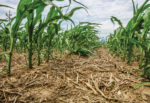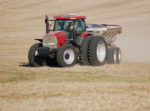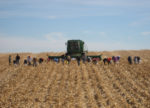Advertise Follow Us
Items Tagged with 'practices'
ARTICLES
No-Till Movement In U.S. Continues To Grow
The most recent Census of Agriculture found no-tilled acres in the U.S. reached a new high of 96 million acres in 2012, but experts say obstacles remain to more consistent adoption of the practice.
Read More
Tips For Getting More From Your ‘P And K’
Building healthier no-till soils, frequent soil testing and other readily available products and practices can help no-tillers stretch their fertility dollars further, regardless of their application system.
Read More
Tips For Harvesting Downed Corn, And Dealing With The Aftermath
Downed corn can have a significant impact on profits and no-till systems, but here are tips and considerations to make the best of a bad situation.
Read More
Pillars Of No-Till Adoption, Growth Are Recognized
The latest class of No-Till Innovators have strived to improve no-till practices and help farmers be better stewards of farmland.
Read More









